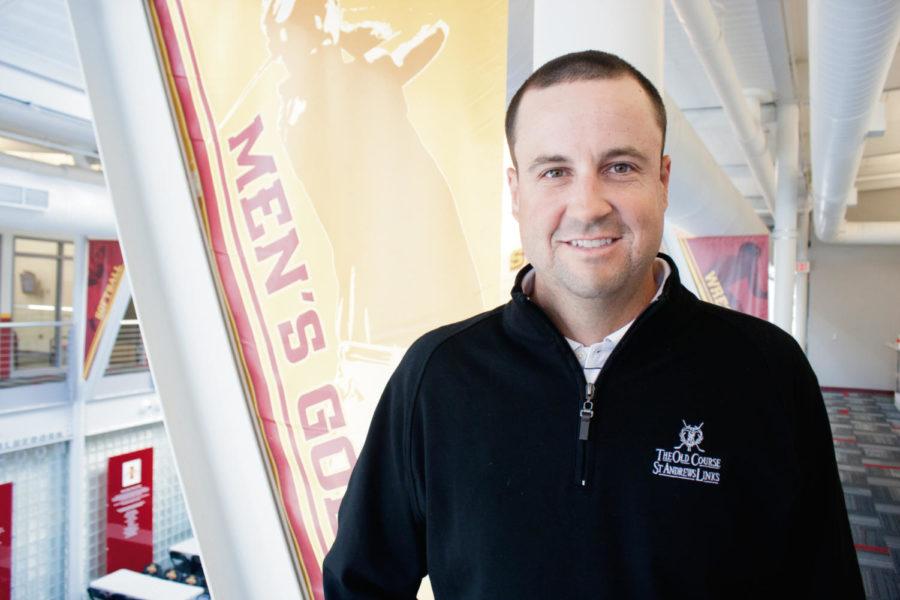Tank’s coaching transcends collegiate level
Photo: Andrew Clawson/Iowa State
Head coach Andrew Tank said that this is a great opportunity for the sport to grow on a world-wide level.
January 15, 2014
After leading his team to the NCAA Regionals in 2012 and a top-50 ranking this fall, it would be easy for ISU men’s head golf coach Andrew Tank to rest on his laurels.
Instead, Tank also moonlights as coach to PGA Tour rookie Bronson La’Cassie. The player-coach relationship dates back to their time together at the University of Minnesota from 2003-06, where Tank was an assistant coach and La’Cassie was among college golf’s elite.
“He was very successful in college, he was a three-time All-American,” Tank said of the Brisbane, Australia, native. “He came right in as a freshman and was competing at a high level.”
La’Cassie’s collegiate prowess also translated to the amateur ranks, where he won the 2006 Western Amateur, an event that claims Phil Mickelson and Tiger Woods as past champions.
In 2007, it was a natural progression for La’Cassie to try his hand professionally, playing in minor league tours across the United States and Australia. La’Cassie struggled to find consistency in his game, however, and decided to part ways with his longtime coach from Australia.
“I had some mixed results, wasn’t very consistent. I wasn’t seeing him enough and really wasn’t happy [with] where things were headed,” La’Cassie said. “I had worked with coach Tank before and liked what we’ve done in the past.”
The struggles La’Cassie alluded to were evident early on in his 2013 season on the Web.com Tour, golf’s equivalent to Triple-A baseball.
He missed the cut in five of his first six tournaments and plummeted outside of the coveted top 25 in the money list, a benchmark to achieve PGA Tour membership for the following season.
When Tank and La’Cassie reunited in April 2013, a resurgence in La’Cassie’s game soon followed.
“We worked on his putting a lot throughout the spring and summer, some things with his setup and golf swing and tendencies,” Tank said of La’Cassie’s path to improvement. “We have a joke that some of these things go back to things he was doing in college, even. It’s pretty typical for golf, you’ve got your tendencies.”
The two did much of their work during the summer at Iowa State’s new practice facility, which La’Cassie claims to be “one of the best in the country.”
With La’Cassie making occasional trips to Ames to practice, it has allowed Tank to stay close to his team and reduce the grind that can come with constant travel.
“I don’t think it’s been too bad,” Tank said of juggling both coaching responsibilities. “With Bronson, he’s pretty easy to work with. He’s been able to come down to Ames and spend a day or day and a half to work on some stuff.”
While at the facility, Tank has introduced La’Cassie to the team, providing an avenue for players to pick the brain of a tour professional.
“I think it’s fun for the guys to be able to ask him questions and hear from a player’s perspective what it’s like being a professional golfer … because they have those dreams and those goals,” Tank said.
While ISU golfers still have a ways to go before pursuing their professional dreams, La’Cassie took a step forward in achieving a dream of his own.
La’Cassie reeled off eight made cuts in 12 starts and his game appeared to be on track. His newfound success culminated in August with a win in the Cox Classic. It was his first professional win in four years, but more importantly, it assured a top-25 finish.
Now on the PGA Tour, La’Cassie has struggled out of the gate once again, missing the cut in his first three events. Despite the slow start, La’Cassie remains faithful in the work he is putting in with Tank.
“We’ve come up with a pretty good plan and have stuck to it. It hasn’t always been great, but the results are getting better. Things are starting to head in the right direction,” La’Cassie said.
His resiliency and work ethic are sources for optimism for Tank as he works to help La’Cassie recapture the magic he found in his game last summer.
“What I really like is that it’s easy to get him back on track,” Tank said. “Once you give him the right information, some of those reminders, he picks it up quickly and can go work on it. I think that’s what will continue to make him successful.”







